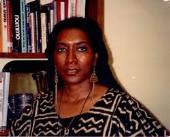 Clenora Hudson-Weems
Clenora Hudson-WeemsThe price for campus activism, the rising up against oppression and demanding that the pervasive practices of racial discrimination end may very well be costly; however, in the end, confronting the debilitating crime itself — racism and racial dominance — is every bit worth it as history has proven. Student unrest and campus activism historically have been responsible in many ways for bringing about justifiable and positive changes in academe itself, fighting for equal education, rights and justice for all regardless of race, color and creed. This is the very foundation of “America, the land of the free, the home of the brave.” It is what so many others from foreign lands come here for and what we in America continue to uphold as our birthright — “liberty and justice for all.” This is our doctrine, our philosophy, the American way of life, indeed, the raison d’être for existence.
A lot of attention is on diversity today, but we must know that true diversity comes in both thought and color/culture, and establishing Africana studies as a discipline was essential in securing the educational component. But just how did Black/Africana studies come into being in the first place, as it was clearly not served on a silver platter for the ultimate benefit of all? To be sure, it was non-existent. How did these areas become viable fields of study at universities across the country? There was a time when even historically and predominantly Black colleges and universities did not offer this area of expertise, as they were modeling their curriculum after White standards.
A classic example of student unrest during the searing 1960s was when students at Cornell University, for example, shut down the campus and closed its main building with a campuswide sit-in demonstration until their demands for the inclusion of Black studies were met. Without that, the premier Africana Studies and Research Center at Cornell University would not have come into existence, nor would it be successfully thriving today as a model for authentic intellectual Africana research. Were it not for bringing Black studies into the curriculum, we would probably be still thinking that Egypt is not in Africa; that Africa is a country, rather than a continent; that Africa is the poorest rather the richest continent in the world, endowed with natural resources — diamonds, gold, oil, etc. Moreover, we would not know that Africa is the cradle of civilization where the first and major university in the world, The University of Timbuktu, is situated. Of course, then move from the wonders of Africa and its people to the people of the African diaspora, such as African-Americans, Caribbeans, Afro-Brazilians of South America, African Canadians, African Europeans, etc., and their many contributions to the world.
Thank God that we student-activists of the 1960s, in the midst of the civil rights and the Black Power movements, stood up proudly in demanding our rights to educational inclusion, while supporting our professors and mentors whose primary mission was to educate and protect the lives and goals of their students. That said, Maxwell Little, one of the founding members of Concerned Student 1950, which spearheaded the demonstration at the University of Missouri, later expressed remorse for playing a seminal role. I surmise that there is the possibility of the blaming the victim syndrome, an age-old tactic, culminating in being physically and mentally broken down by a system that continues to oppress via denial and misinterpretations.
The victim is now led to believe that he was better off before he and his colleagues rose up against racial oppression, and now, in shame and embarrassment, regrets having cost both himself and his family and friends, as well as the perpetrators of continued systemic racism, any shame and inconvenience due to his commitment and positive affirmative actions. I can only regret that the Black faculty and staff did not take their 2002 initiative of confronting long-existing racial discrimination at Missouri to a point of completion, as these students are now attempting to do. Perhaps they would not be suffering from the same root problem of the Black faculty and staff then, whose suffering has not ceased, due to tremendous disrespect and lack of retention at the university, indeed, affected by racist dominance.
On a final note, it saddens me that still some do not see that some personal losses and sacrifices are needed for a people to move forward, which does not suggest that we forget the past wrongs, but rather learn from them as we properly and completely correct them. That has been the rich legacy of Black life in particular, beginning with the experiences on the slave ship; insurrections with Nat Turner; the Civil War; the civil rights movement, with Emmett Till as the “sacrificial lamb”; Rosa Parks and Dr. Martin Luther King Jr.; the Black Power Movement, up to today’s Black Lives Matter movement, with Emmett Till continuums. We still call for ending senseless racist atrocities so that we, all people, can at last elevate ourselves to the level of true human beings who love and respect all humankind.
Clenora Hudson-Weems is an English professor at the University of Missouri.















